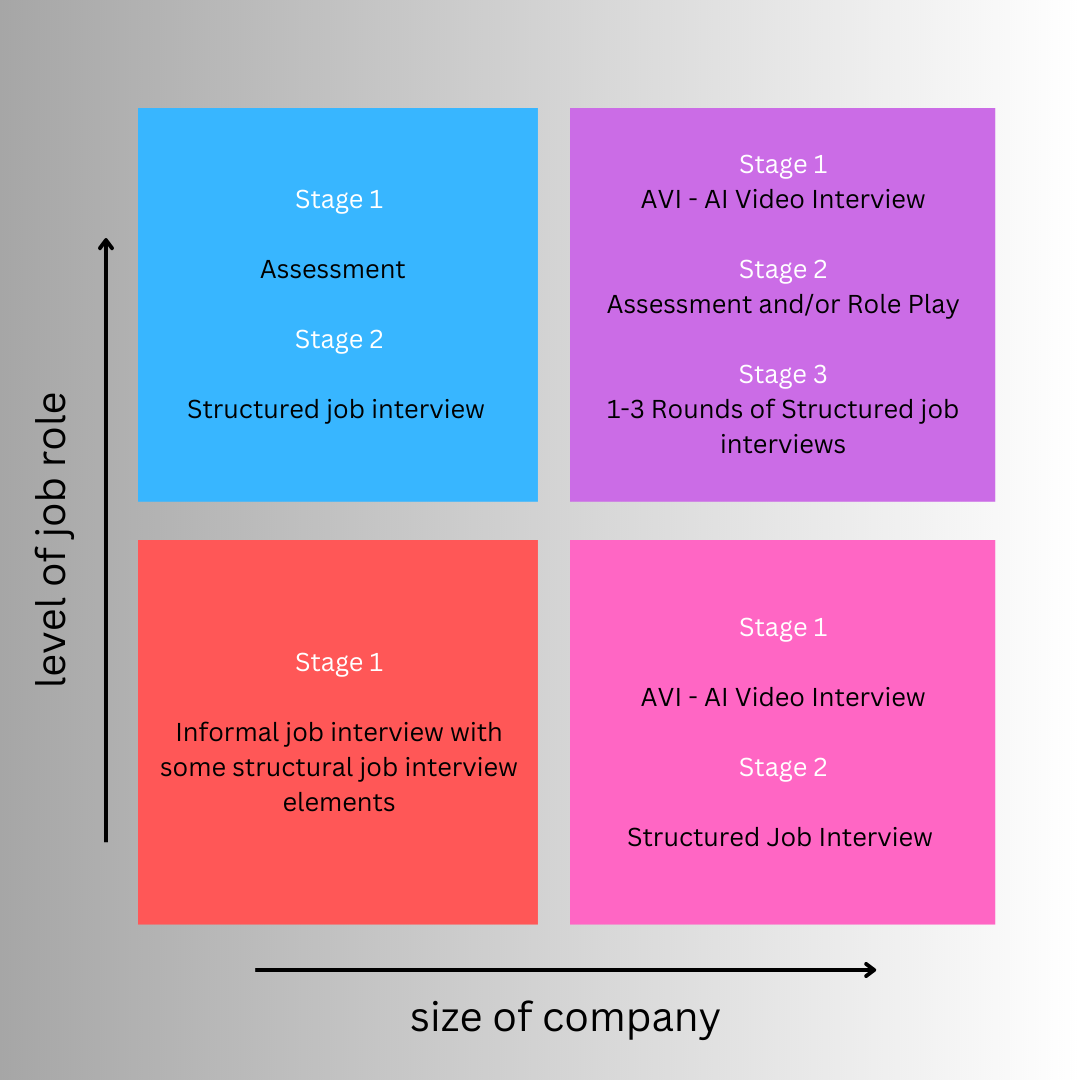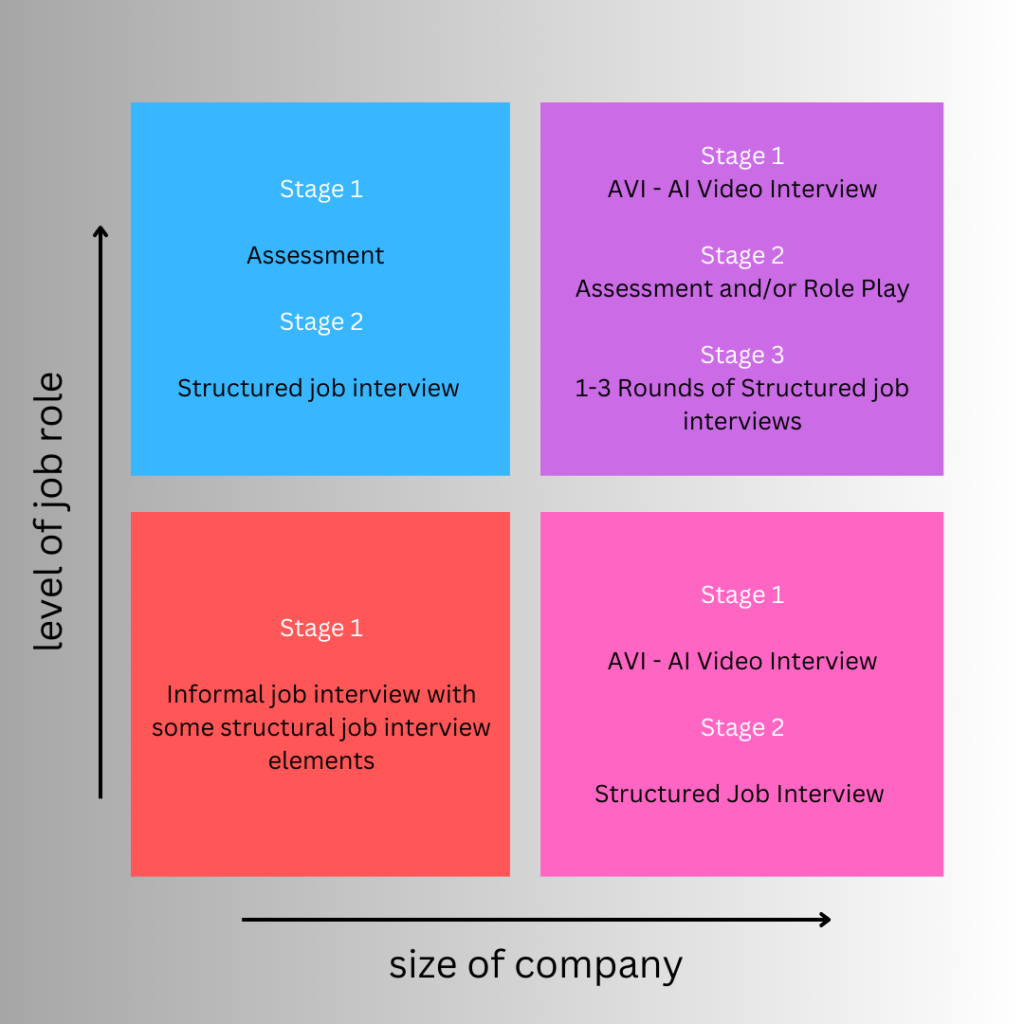A job interview is a crucial opportunity to showcase the required skills, experiences, and personality traits, that meet the requirements of the job criteria, to a potential employer.
While verbal communication (including words, volume, and tonality) plays a significant role in landing a job offer, it is essential not to overlook the power of non-verbal cues, particularly body language.
Body language refers to gestures, facial expressions, and physical cues displayed by an individual – stance, how you hold your head, and the position you take when sitting in a chair.
Positive (or open) body language can enhance your chances of success in a job interview by conveying confidence, professionalism, and a genuine interest in the role. This is because an interviewee who feels confident will express their confidence levels in their body language.
At the subconscious level, the interviewer will believe the applicant is relaxed, open, approachable, and confident. Positive and open body language creates rapport and trust, and tells the recruiter that the individual in front of them is suitable for the role.
In turn, the interview panel, through the candidate’s non-verbal ques also feels at ease during the interview process, which leads to individual interviewers asking more follow-up questions and scoring interview answers high due to the positive outcome of the halo effect.
The Impact of Body Language in Job Interviews
The key to positive interview body language is creating the impression of a confident and competent potential employee.
Ideally, the two Cs impression – confidence and competence should be natural. After all, the recruitment process is about asking the applicant questions about their own experiences and their knowledge.
In reality, most job hunters create an ‘all or nothing’ scenario – ‘if I don’t pass the job interview my life is over!!!!’ creating excessive levels of stress which leads to memory loss, short stumbling answers, and an increase in filler words and self-disclosed weaknesses.
Research from Amy Cuddy, a social psychologist and professor at Harvard University, who became famous for giving a Ted Talk on ‘your body language may shape who you are’ shows how body language links to hormone levels and our emotional reactions.
When body language is open, testosterone (dominance hormone) goes up, and cortisol (stress hormone) reduces.
Stress, naturally, makes people close up – making ourselves look smaller. Job applicants see this all the time in the job interview waiting room, with nervous candidates crossing their arms, tucking their feet under the chair, head down, and touching the neck or face. These stress-related gestures cause our testosterone to decrease and cortisol levels to rise.
Amy also found that standing in a positive and confident stance, even for a few minutes, can boost feelings of confidence, and might have an impact on our chances for success.
The confident stance technique also works when standing in a posture of confidence, even when you don’t feel confident.
Conveying Confidence and Professionalism
Positive body language exudes confidence and professionalism, two traits highly valued by employers.
More important, is how the non-verbal confident body language improves verbal communication.
The research undertaken by Amy found that after just a few minutes of holding a power postures (such as standing tall with your feet apart, chest open, and hands on your hips) people feel more confident and are more likely to act bolder than they would when stood within a stress posture.
In short, the body (stand confident) can influence the mind (feel confident), just as the mind (feel anxious) can influence the body (stress posture).
A firm handshake, maintaining eye contact, and sitting up straight signal that you are self-assured and capable. This can make a strong first impression and instill trust in your abilities.
Active Listening and Engagement
Active listening during a job interview is crucial to demonstrate your interest in the conversation, and therefore the job role.
Nodding occasionally, leaning slightly forward, and providing attentive facial expressions indicate that an applicant is actively processing the information being shared.
Confident individuals listen naturally, whereas a nervous job applicant worries about how they will be viewed, instead of active listening, will go inside themselves to think about a potential answer.
In any conversation, a person with high self-esteem will listen, think, and then speak. This is an external focus, compared to the internal focus of a stressed individual.
Listening, thinking, and speaking, create natural pauses during the two-way conversation. Again, the pauses created by a confident communicator signal confidence to the individuals on the interview panel.
Active Listening Creates Rapport
Listening is a key part of communication. Confident communication builds rapport, and rapport creates trust.
One way to check that an employer has favored an applicant is by observing both the applicant’s and the interviewer’s body language.
If the interviewer naturally starts to mimick the interviewee’s gestures (subtly mimicking their posture or hand movements) this is a sign that a strong rapport has been created.
Purposely mirroring the interviewer’s body language can also build rapport as the mirroring of movements creates a sense of familiarity and likability, fostering a positive impression.
In the main, body language should reflect the applicant’s enthusiasm for the job role. Using hand gestures to express your points, maintaining a warm and approachable facial expression, and leaning in when discussing exciting aspects of the role can highlight your genuine interest.

Someone with a real passion for the sector and job role will smile more; A warm and genuine smile can work wonders in a job interview and create a positive and memorable experience. Research has found that smiling conveys a positive attitude, approachability, and likeability. It helps build rapport with the interviewer

In a job interview, positive body language complements verbal communication and significantly impacts how you are perceived by interviewers.
Demonstrating confidence, professionalism, active engagement, and genuine interest through your non-verbal cues can leave a lasting impression and differentiate you from other candidates.
Remember to maintain eye contact, use appropriate hand gestures, and be mindful of your posture throughout the interview. A warm and genuine smile can convey enthusiasm and likability. By mastering positive body language, you enhance your chances of success in job interviews and project yourself as the ideal candidate for the role.












